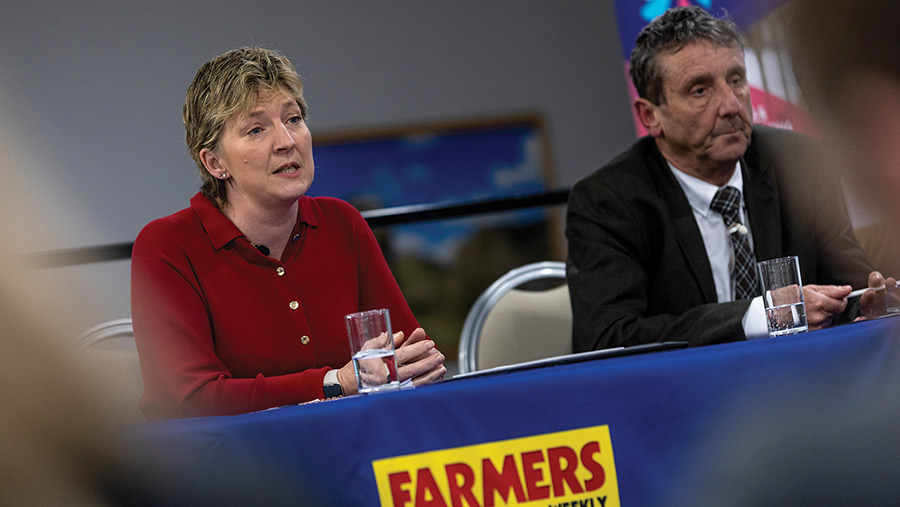Exclusive: Morrisons explores premium for Red Tractor green module
 Sophie Throup © Richard Stanton
Sophie Throup © Richard Stanton Morrisons is exploring the possibility of providing a premium for a future Red Tractor environment module, following a farmer backlash over the Greener Farms Commitment (GFC).
The retailer’s head of agriculture and sustainable sourcing, Sophie Throup, also hinted that the introduction of an environmental module was still on the cards, as Red Tractor had been “answering a call from retailers” when developing it.
The revelation came as dairy analyst Chris Walkland called for a change of leadership at Red Tractor at the Semex conference in Glasgow.
See more: Farmers Weekly Podcast Ep 188: Heated debate over Red Tractor continues
Ms Throup, who is also the British Retail Consortium representative on Red Tractor’s Assured Food Standards (AFS) board, was speaking at Farmers Weekly’s Question Time event in Harrogate last week.
She said: “We have an enormous amount of pressure that comes from interest from customers about environmental footprint, but also a huge amount of questions that come from other stakeholders in the business.
“Shareholders and investors and lots of other people are really demanding transparency and asking for data that we just don’t have at the moment.
“We’d much rather be able to have one system that gathers that in a way that, hopefully, can be done at the same time as the farm audit than to have lots and lots of numerous different systems.”
Ms Throup’s remarks are the first public comments from a retailer on the GFC controversy, with the British Retail Consortium redirecting all previous requests for comment from Farmers Weekly to Red Tractor.
At the Question Time event, she also said she believed Red Tractor still “absolutely” had value and purpose as it streamlines the number of audits faced by farmers.
She went on to compare Red Tractor to the British Lion Code, which is managed by the British Egg Industry Council with no retailer representation, claiming it was “significantly more complicated” than Red Tractor standards.
But she acknowledged there were “lessons to be learned” on how Red Tractor communicates with farmers, and agreed many farmers did not believe being assured had a value for them.
“I understand that comment about not getting anything extra from Red Tractor,” she said.
“That’s why with the environment module, certainly at Morrisons we’re looking at how we can potentially support a modular addition with additional support rather than just the core buying price.”
There was a further spat about Red Tractor at the Semex conference, where Mr Walkland and NFU president Minette Batters clashed over his calls for a change of leadership.
During a prickly session, Ms Batters urged Mr Walkland to “play the ball and not the man”.
Speaking to Farmers Weekly after the event, Mr Walkland said: “Only by changing the top will we have a chance of regaining the trust and respect of Red Tractor.
“There has to be a management change, because if there isn’t Red Tractor will continue to deteriorate in the eyes of farmers and the food industry.”
Red Tractor refused to comment.
Link between GFC and WWF basket under fire
Farmers attending the Semex conference were warned they would be “signing up for a 20% reduction in meat and dairy consumption” if they joined any Red Tractor environment module.
The connection between the Greener Farms Commitment and the World Wildlife Fund (WWF) “basket” was first revealed by Farmers Weekly in an article about the £295,000 cost of developing the GFC.
Retailers had been planning to use the introduction of the GFC to help them meet their WWF basket commitments.
At the conference, dairy analyst Chris Walkland raised the alarm and was joined by the Tenant Farmers Association (TFA), which also shared its concerns on social media.
In a statement, the TFA said: “The [WWF basket] initiative aims to ‘halve the environmental impact of UK shopping baskets by 2030’ and includes measures such as reducing meat and dairy consumption by 20% and fertiliser use by 80%.
“While the TFA supports initiatives which will truly maintain and improve the environmental impact of food production, it rejects these ideas as being reasonable, credible or beneficial.”
